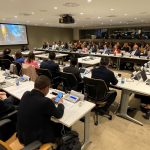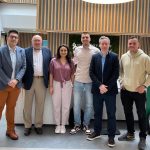

How to Work for Families Worldwide
Preparation and follow-up of the
Second World Social Summit in 2025
University of Warsaw, Old Library Building
Krakowskie Przedmieście 26/28, 00-927 Warszaw, Poland
Tuesday 3rd, Wednesday 4th and Thursday 5th September, 2024

Organized by the International Federation for Family Development, Family Advocacy Association Poland, and the Faculty of Law and Administration of the University of Warsaw, with Wardynski & Partners as the Polish official partner, and under the honorary patronage of the Commissioner for Human Rights of the Republic of Poland.
The Workshop is an ideal opportunity to get to know international organizations from the inside and learn about internships at the United Nations in direct contact with IFFD representatives.

“It has been a really good experience to learn how family is a key factor to help us to have better societies. So I recommend it to all who want to promote a more human world.”
Perrine Bruvier
France

“The workshop was packed with insightful speakers and passionate participants. The discussions were quite inspiring, and work sessions led to innovative ideas.”
Charles Aigbona
Nigeria
SCHEDULE & RECORDINGS
Tuesday, September 3rd
10:00 – 17:00
10:00
Registration
10:30
Welcoming Remarks
José Alejandro Vázquez, PhD
Director of International Relations and Representative to the United Nations,
International Federation of Family Development (IFFD)
Anna Zbiegień Turzańska
Vice Dean of Faculty of Law for Development and
Cooperation with the Socio-economic Environment, University of Warsaw
Advocate Trainee Franciszek Wiącek
Associate, Wardyński and Partners Law Firm
President, Family Advocacy Association (FAA)
11:10
Coffee Break
11:30
“The Second World Summit on Social Development”
Advocate Marcin Karol Piechocki
M. Jur (Oxford), LL.M (Kiel)
12:15
“Participation of Older Persons and Active Healthy Ageing”
Ignacio Socías
LL. D. (Madrid), Advocacy Talent Acquisition,
International Federation for Family Development (IFFD)
13:00
Lunch Break
14:30
“Creating Better Opportunities for Young People”
Veerle Miranda
Senior Economist at the Organisation for
Economic Co-operation and Development (OECD)
15:15
“Children’s rights in vulnerable situations: refugees”
Agnieszka Matejczuk
Chief Expert, Office of the Ombudsman for Children
of the Republic of Poland
16:00
“Data for advocacy: the situation of children in Europe”
Daniel Molinuevo
Research manager, Social Policies Research Unit,
EUROFOUND
16:30
End of Session
18:00
Networking Reception
Wardynski & Partners
Wednesday, September 4th
10:00 – 13:00
10:00
Introduction
10:30
Group Discussion and Drafting of the Advocacy Plan on Youth Integration
Facilitator: Zosia Tymińska
Group Discussion and Drafting of the Advocacy Plan on Participation of Older Persons
Facilitator: Stanisław Siwko
Group Discussion and Drafting of the Advocacy Plan on Migrant Integration
Facilitator: Katarzyna Lachman
12:00
Drafts Presentation
Thursday, September 5th
10:00 – 13:00
10:00
Introduction
10:30
Negotiation of the Advocacy Plan on Youth Integration
11:10
Negotiation of the Advocacy Plan on Participation of Older Persons
11:50
Negotiation of the Advocacy Plan on Migrant Integration
12:30
Final Advocacy Plans Presentation

“It is always a great opportunity for you to learn more about the challenges and opportunities that families are facing in today’s political, economic, and social climate.”
Heba Al Farra
Qatar

“Don’t miss out!
The results of our discussions will be presented next year at the level of the European Union and the United Nations.”
Stanisław Siwko
Poland

“I learned a lot from experts in family issues and from students in social science in this task of drafting advocacy plans and presenting them.”
Verlaine Diane Ngankam Yanou
Cameroon

“I got to meet a lot of experts and a lot of students like me who are willing to know how we can contribute and really address the challenges that families are facing.”
Ana Paula Pérez Hernández
Mexico
VISION
To be an inspiration in advocating for a family perspective on policy making as the most meaningful vehicle for the wellbeing of upcoming generations. This approach is informed by both scientific evidence and social progress.
GOALS
- Critically assess the field of international human rights and development, its institutions, strategies and key actors.
- Explore how policy strategies are set, by creating a space where young advocates can discover an innovative style to promote social cohesion.
- Analyze the various challenges that family-responsive stakeholders face together, including governments, international institutions and the private sector.
PARTICIPATION
- Oriented to entry-level professionals or students of social sciences or a related field who have a strong interest in family policies and want to gain experience in the work of international organizations.
- A Certificate is provided to each participant upon attendance of at least 85% of the sessions.
- Active participation is highly recommended.
HISTORY
Around 450 students and young professionals from 39 countries and diverse geographical, cultural and academic backgrounds have attended the first 11 editions of the IFFD Annual Advocacy Workshop. It is part of the IFFD Advocacy Training Project.
CONTEXT
The United Nations General Assembly has decided to convene the Second World Summit for Social Development in 2025, to address gaps and recommit to the principles outlined in the 1995 Copenhagen Declaration on Social Development and Programme of Action and give momentum towards the implementation of the 2030 Agenda for Sustainable Development. It will be held at the level of Heads of State or Government in Qatar from 4 to 6 November.
The Summit will take place almost 30 years after the historic first World Summit For Social Development, where heads of state and government set out an ambitious common vision of social development aimed at social justice, solidarity, harmony and equality within and among countries. The Summit adopted the 1995 Copenhagen Declaration and Programme of Action to place people at the center of development, with 10 commitments including poverty eradication, promoting full employment and social inclusion.
The workshop will focus on studying the Commitments of the Declaration and their implications for the family, as detailed in the Civil Society Declaration for the International Year of the Family anniversary in 2024. More specifically, it will be devoted to the social integration of youth, older persons and migrants and their implications for the family, as detailed in the Civil Society Declaration for the International Year of the Family anniversary in 2024.
When it established the World Day of Social Justice, the General Assembly recognized that social development and social justice are indispensable for the achievement and maintenance of peace and security within and among nations and that, in turn, social development and social justice cannot be attained in the absence of respect for all human rights and fundamental freedoms. In fact, many people around the world are not able to see their human rights respected and are not able to be free because they are not respected as a family.
The pivotal role of the family in social development is an issue of social justice, and the nexus between attention to families and the promotion of human rights and freedoms is incontrovertible. As we reflect upon the global landscape, it becomes evident that the right to form a family remains precarious for many, particularly marginalized groups such as women and youth.
Therefore, central to our advocacy is the recognition of the interplay between the objectives of the Declaration of Copenhagen and the International Year of the Family. These dimensions underscore the multifaceted nature of attention to familial welfare, warranting concerted action.
METHOD
The Workshop is conducted entirely in the English language.
It consists of a three-day training program including
Day 1
Conference (open to the public) – Sessions of experts on the state of the art of this years’ topics; youth integration; participation of older people in social life; and social inclusion of migrants.
Days 2 and 3
Workshop sessions (only for accepted participants) – Negotiations to draft an Advocacy Plan for each topic where every participant is expected to share his opinions and views into shaping a most suitable and agreed version.
COST
The Workshop has no cost for participants.
ADVOCACY PLANS
The Advocacy Plan elaborated every day will be presented at the United Nations and European Union as part of IFFD’s advocacy.
In order to create it, the following questions should be considered and answered:
- Establish measurable objectives.
- Define key messages.
- Determine the communication activities to deliver key messages.
- Decide what resources are necessary to complete each activity.
- Establish a timeline and responsible party for each activity.
- Fix how to evaluate whether you have reached your objectives.

“It was really valuable for me to understand how to use my studies inside public policies. I strongly recommend it to all those who want to change the world through advocacy.”
Leticia Barbano
Brazil

“One of the best things was meeting people from all over the world interested in or working with families in different ways and connecting and learning from each other.”
Caroline Höglund
Sweden
PROGRAMME
1. Youth Integration
There is recurring and mounting evidence that labor market challenges, such as unemployment, informality, lack of social protection and inactivity, disproportionately affect youths. Moreover, an increasing number of governments complement their national development frameworks and employment policies with policies and programmes that target young people. In the realm of measures singling out youth employment, a universal consensus on design and implementation remains elusive.
This complex decision-making process involves navigating the intricacies of crafting policies tailored to the unique challenges confronting youths in labor markets. A pivotal inquiry should arise when evaluating the outcomes of these interventions: Did these policies achieve their intended results? Is feedback from evaluation implemented? This question fuels extensive discussions concerning the effectiveness of such interventions and their direct impact on youth employment. Nevertheless, this question is seldom investigated.
2. Participation of Older Persons
Over the past 50 years, socioeconomic development in most regions has been accompanied by large reductions in fertility and equally dramatic increases in life expectancy. This phenomenon has led to rapid changes in the demographics of populations around the world: the proportion of older people in general populations has increased substantially within a relatively short period of time. Numerous underlying physiological changes occur with increasing age, and for older people the risks of developing chronic disease and care dependency increase.
Health care professionals in clinical settings can detect declines in physical and mental capacities and deliver effective interventions to prevent and delay progression. Yet early markers of declines in intrinsic capacity are often not identified, treated or monitored, which are crucial actions if these declines are to be reversed or delayed. The majority of health care professionals lack guidance or training to recognize and manage impairments.
3. Migrant Integration
Migration is an important enabler of sustainable development and therefore has significant potential for contributing tothe well-being of individual migrants and to their communities of origin and destination. For migration to indeed be beneficial in this way, migration governance actors must ensure that newcomers are successfully integrated into society. When insufficient or ineffective efforts are made to ensure integration, newcomers can become marginalized, thus more vulnerable to risks of all kinds, for example, lack of educational opportunities, language barriers and the inability to find decent work.
Despite this growing interest, there is no consensus on what effective migrant integration and social cohesion fully entails, whether programmes should target both temporary and permanent migrants, and whether social cohesion policies and programmes are as relevant for countries of destination as for countries of origin. At the same time, the very terminology related to integration and social cohesion is usually highly disputed.


































































